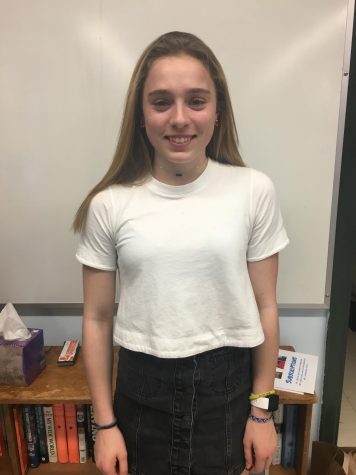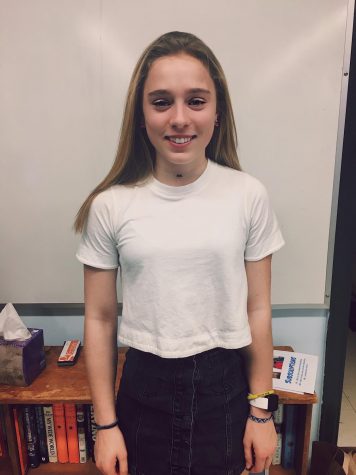Fitting the mold: Photo editing takes over WHS
Editing apps infiltrate social media, leading students to strive for perfection
Shrink the waist.
Erase the acne.
Whiten the teeth.
Shape the arms.
Welcome to the age of DIY photo editing.
In this technologically-advanced, social media-driven society, every picture is a good picture with countless photo-editing apps on the market. Anyone can look runway-ready with a quick resize or whitening tool.
Gone are the days of bad lighting or bad angles; all of the photography problems that once plagued us can be fixed with free apps on our phones.
The concept of editing an image to perfection is no longer restricted to big-time magazines. Now, anyone can fix their imperfections by sitting on their couch and watching a quick tutorial.
WHS students are no exception. They are fully engaged in this editing phenomenon. In order to protect the identities of the students interviewed for this story, students’ names will be withheld.
“It’s becoming a secret trend,” said a senior girl (who will be referred to as Speaker A).“No one really talks about it, but we all know we do it.”
Many students use a variety of apps to create the perfect post—or should we say perfect body? “I use Facetune, VSCO and Afterlight for about 20 minutes on almost every picture I post on Instagram,” said another senior girl (to be referred to as Speaker B). “I usually edit my waist and arms to make them smaller, and I use the detail tool to make my eyes pop more.”
Other notable apps include Perfect365, Aviary and Photable. Regardless of which app is used, all of these programs champion the same goal of creating the perfect picture every single time.
“I mostly edit my face: smoothing out my skin and whitening my teeth,” said a senior girl (Speaker C). “Generally, if I don’t like how one part of my body looks, but I still like the picture, I’ll edit those parts.”
According to a 2014 survey conducted by The Renfrew Center Foundation, an organization dedicated to treating eating disorders, 50 percent of 1,710 people interviewed on social media admitted to editing their photos before they posted them. Of those who touched up their posts, 12 percent did it because they were unhappy with their appearance.
“Girls always have this pressure to look perfect and with these apps, being able to fix the things that you don’t like about yourself is so easy now,” said a junior girl (Speaker D).
According to Speaker B, editing posts, specifically on Instagram, has created a snowball effect. “Everyone is trying to be as pretty as the prettiest girl, so when people post their edited photos on Instagram, it makes other people turn to editing apps too,” she said.
This creates a culture of perfection that is harmful to the developing brain of a teenage girl. This age is already filled with self-consciousness and social anxiety, and these apps capitalize on these insecurities.
“There’s a lot of picture-editing in the media, making body standards pretty ridiculous and unachievable,” said a sophomore girl (Speaker E). “With impressionable teenagers, that only makes them feel worse about themselves.”
Image-altering apps have become such an integral part of the photo-posting routine that many girls aren’t even comfortable posting unedited pictures. They scroll through their Instagram accounts and see thin girls with seemingly perfect hair and skin. This creates impossibly high standards of beauty.
“I feel pressured to look a certain way because of the Instagram models and their perfect bodies,” said Speaker B. As a result, she has downloaded these apps to edit her waistline to look more like the women she sees on social media every day.
These “perfect” Instagram models serve as role models to many teenagers, prompting thoughts like “If every famous person is editing their photos, then why can’t I?” said Speaker C.
Speaker B agrees, admitting she started editing after she realized that many of her favorite stars did too.
“I started editing my photos sophomore year after I found out that Khloe Kardashian used Facetune,” she said. “So I tried it and never went back.”
But what happens when a photo is obviously edited? Distorted and curvy lines in the background of a picture prove that it has been altered. According to Speaker E, obvious editing can label people as attention-seekers, and can make them look worse than if they hadn’t edited their photos at all.
“I spend a lot of time editing it so people won’t notice,” said Speaker A. “I make it look as natural as possible; sometimes it takes me like five tries.”
The irony is clearly present. Photos are being edited to look natural, even though the editing in and of itself creates just an illusion of perfection.
“You’re judged if you don’t look good enough in your pictures, and you’re judged if you edit your pictures,” said Speaker C. “You have to pick your poison.”
According to a study conducted by the Associated Press-NORC (National Opinion Research Center) Center for Public Affairs Research, 76 percent of teenagers ages 13-17 use Instagram. The app has become more than just a way to pass time and share your experiences with friends —it is a piece of ourselves. The incredible popularity it has gained since its creation eight years ago has made it less of a social media app, and more of an extension of reality. So, with easy accessibility to various editing apps, girls are able to control this piece of their lives, and create an ideal version of reality.
This is why Speaker D takes advantage of the apps at her disposal. “I edit [my pictures] because I feel like I look better with it, and self-esteem has always been a big issue for me,” she said.
So if these apps allow girls to feel more confident, can they actually benefit self-esteem? Or is the false reality of being able to make yourself “perfect” detrimental to a growing teenager’s brain?
Facetune declined to comment on the benefits and drawbacks of teenage girls using its app.
Photo-editing apps advertise their services directly on Instagram, causing these ads to pop up on users’ feeds. The ads show pictures of successful edits, which are integrated into one’s feed, right alongside the posts of friends.
“The fact that these types of apps advertise on Instagram is really messed up,” said Speaker B. “It makes people want to change themselves for the approval of others.”
Speaker D agrees that advertisements may influence Instagram users to try these apps; at the end of the day, they are for-profit businesses trying to gain new customers. “The app company probably knows people want to edit themselves to look better on Instagram, so I think it’s kind of smart, yet sad, that they’re advertising so girls can change the way that they look,” she said.
Ultimately, with the tools at their disposal, it is up to each individual to determine whether they want to use these apps, and for what reasons. They must weigh whether it’s better to look good or to look natural, even though these two qualities aren’t mutually exclusive.
“I honestly don’t know why I edit my photos,” said Speaker B. “I used to think people would judge all the small things, so I would edit them out. But I’ve come to realize that the small things are what make it look like a real picture.”


